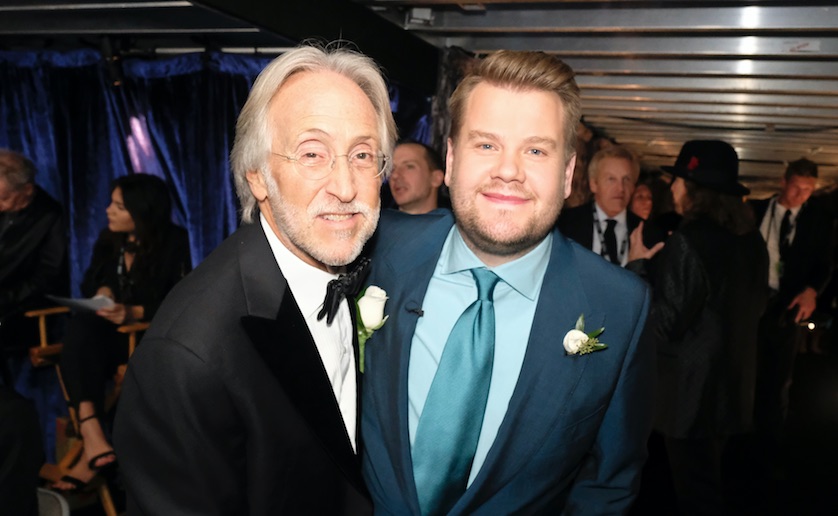
Photo of Neil Portnow with host James Corden backstage at the 2018 Grammy Awards, by Timothy Kuratek
—
He's been president of the Recording Academy for over 15 years. And it's time for Neil Portnow to go.
When asked Sunday night why only one woman (Alessia Cara for Best New Artist) took home a Grammy during last night's telecast, Portnow seemed to place blame on a lack of effort from female artists.
“It has to begin with ... women who have the creativity in their hearts and souls, who want to be musicians, who want to be engineers, producers, and want to be part of the industry on the executive level," he said after the show.
He insisted women need to "step up," adding: "I think they would be welcome. I don’t have personal experience of those kinds of brick walls that you face but I think it’s upon us — us as an industry — to make the welcome mat very obvious, breeding opportunities for all people who want to be creative and paying it forward and creating that next generation of artists."
Despite being the lone female nominated for Album of the Year, Lorde wasn't offered a solo performance opportunity, unlike her male counterparts (on a related note: U2, which wasn't nominated for anything, made three separate appearances during the telecast). And while SZA was the most-nominated female this year, she walked away with no wins.
It's worth noting Lisa Loeb, Reba McEntire, Aimee Mann, CeCe Winans and Carrie Fisher were among a handful of female winners during the Grammys' pre-telecast ceremony. And Kendrick Lamar's win for Best Rap/Sung Performance was also shared with Rihanna.
And while they didn't win any trophies, many of the night's brightest and most meaningful moments were delivered by women: Kesha's powerful "Praying" performance, with the backing of Cyndi Lauper, Andra Day and other ladies; Camila Cabello's speech in defense of Dreamers; and Janelle Monáe's rallying cry for the #MeToo movement.
Portnow first took the reins of the Academy back in 2002, overseeing his first Grammys in 2003. And while his contract was set to expire in 2015, the Academy’s Board of Trustees voted unanimously to extend his tenure another four years, keeping him in his post until 2019.
During that time, Portnow has navigating through a series of controversial Grammy and Recording Academy moments, including the 2011 decision to trim the number of Grammy categories from 109 to 78. He usually responds with a safe, vanilla statement.
And each year during the Grammys broadcast, he comes out on stage, perhaps makes a joke and then delivers a harmless, unmemorable speech about streaming payments or copyright laws, as he did last night.
In addition the lack of representation taking home gold, this year's Grammys telecast viewership was down as much as 20% from last year, perhaps indicating the lowest ratings ever for the music trophy show.
That's not to say the Grammys haven't made improvements. As part of the aforementioned 2011 cuts, the Academy eliminated the male and female vocal categories, allowing all acts to compete head-to-head, regardless of gender. And following the appeal by Variance and other publications in 2015, the Best Rap Album category is now televised.
But 2003 was a long time ago, especially in this industry. Ironically, that was the last time the Grammys were held in New York, as they were again last night. It was also the same year Norah Jones swept all four major categories, Album of the Year, Record of the Year, Song of the Year and Best New Artist.
It's time for Neil Portnow to step down. Not in 2019 or 2020, but now. Not because it will solve all the Grammys' problems, but because he is part of the Grammys' problems. And it's time to move forward.































